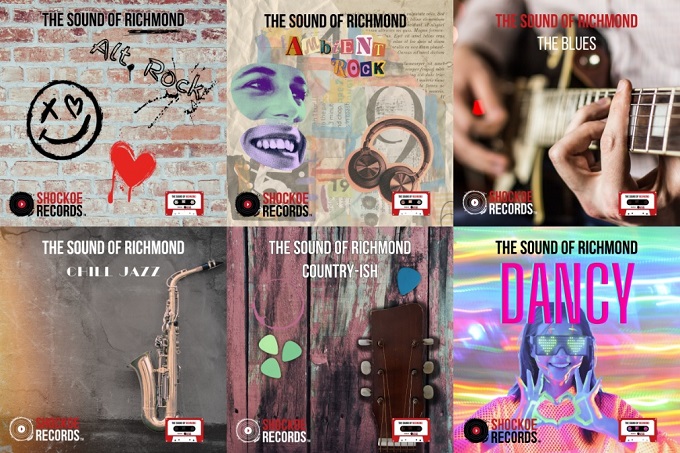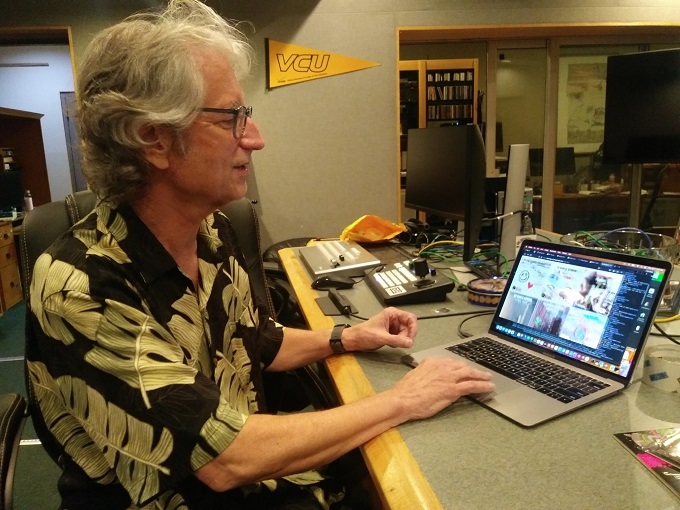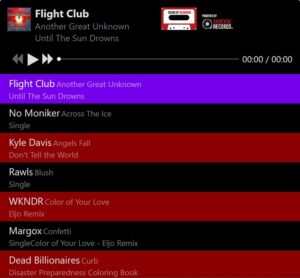
A screenshot of the soon-to-launch Sound of Richmond website, which features playlists of Richmond artists in different genres.
When they host their second annual 804 Day music festival this Friday, the folks behind record label Shockoe Records will be rolling out a new Richmond-specific music streaming service that they’re aiming to market to area businesses.
The 2-year-old label is set to launch The Sound of Richmond, a subscription-based streaming platform featuring solely local artists, in conjunction with the 804 Day festival it’s putting on to kick off Richmond Music Week, a multi-event celebration of the local music scene.
Not to be confused with Richmond recording studio Sound of Music, The Sound of Richmond is the brainchild of Shockoe Records artist Holy River and the label’s managing partner Carlos Chafin, who has spearheaded the effort for over a year.
Chafin, who leads Shockoe Bottom studio In Your Ear, said the concept for Sound of Richmond is to provide local businesses and venues with made-in-Richmond playlists while also helping artists make money from being featured, something he said can be challenging with larger platforms.
“It started out as an idea from one of our bands, Holy River, who said wouldn’t it be great if local music could be played in coffee shops and places like that, instead of just these random Spotify or Pandora playlists that have nothing to do with much of anything,” Chafin said.
“We said, ‘Yeah, that’s a lot of work, but it’s a great idea. Somebody should do it.’ And of course that boils down to: ‘Well, who’s that going to be?’ And that would be us.”

Carlos Chafin showing Sound of Richmond, which he has been building for over a year. (Jonathan Spiers photo)
Where businesses that play Spotify or Pandora can be required to pay licensing fees, and where artists who are featured often have to push performing rights organizations (PROs) like BMI and ASCAP for royalties, Chafin said Sound of Richmond is structured to solve both issues by paying the license fees upfront and helping artists get paid.
“We’re taking that burden off their shoulders,” Chafin said of the licensing fees, which Sound of Richmond makes up for through its user subscriptions.
“That contributes to part two of the equation,” he added. “What we’re doing is we’re saying to the artist: we’re playing your stuff, we’re reporting it to your PRO, now make sure they pay you. And we’re helping them to actually do that.”
Songs on Sound of Richmond are grouped by genre, with playlists such as “Chill Jazz,” “Country-ish,” “Dancy” and “Heavy.” There are also playlists for alt rock, ambient rock, blues, folk-Americana and jazz/R&B.
Playlists can be shuffled and range from 80 to as many as 700 songs. Chafin said the longest playlist will play for a week without repeats, and songs will be added and swapped out over time.
Both active and inactive Richmond artists are featured, including big names such as Lamb of God and Lucy Dacus. Chafin said he’s reached out to all of the artists, many of whom he knows or has worked with, and that any who ask to be removed will be.
Subscriptions start at about $25 a month for a user or business that serves 150 or fewer customers daily. Larger and busier businesses and venues would pay more, Chafin said.
“Let’s say you’re a big venue and you want to use this before shows, let’s say the new amphitheater they’re building, we’d have to negotiate that fee and make sure we’re covered with ASCAP/BMI,” he said.
Chafin sees Sound of Richmond becoming profitable once it’s subscribed more than 40 or 50 businesses. He said Richmond Region Tourism is making introductions to see if Sound of Richmond could be played at the Greater Richmond Convention Center, and he said RRT recently took the streaming service on the road to promote Richmond’s music scene at a convention.
“We aren’t going to get rich, but obviously the mission is to get this music out and get it into venues that are playing whatever now,” he said. “If it makes money, we’ll use it to plow back into it to promote it more. I don’t think we can get rich on this, but I do think it can be profitable.”
The streaming platform is through Amazon Web Services, and its paywall and subscription service are managed by software company Stripe. Chafin said having the platform on AWS makes is scalable for potential expansions in other markets.
“If it starts really getting popular, or we want to offer this to other cities and incorporate their music or have special-event things, it’s totally easy to scale this,” he said.
Sound of Richmond adds to a mix of music pursuits that have spawned from or are linked to Shockoe Records and In Your Ear, which hosts the weekly Shockoe Sessions Live concert series.
Last year, Shockoe Records held the inaugural 804 Day, the name a play on Richmond’s area code and last year’s event date. While this year’s event is being held Aug. 2 (a Friday versus a Sunday), it will feature the same multistage format that drew large crowds last year to the area in and around 17th Street Market.
This year’s lineup includes Shockoe Records artists Ant The Symbol, Holy River, Weldon Hill and recent signees Rein and Los Hermanos Alacranes. Local rapper Nickelus F is the headliner.
The music will continue through Richmond Music Week, consisting of events over 10 days at venues including The Valentine Museum, The Camel, KavaClub and Plan 9 Records.
804 Day will also see the official launch of Sceen, a new live music pass service in which subscribers pay $20 a month for access to local concerts that have not sold out. Users receive notices of shows they can get into, and proceeds from subscriptions are shared with artists while venues can benefit from more food and beverage sales. Local tech entrepreneur Luke Rabin is behind the venture.
Chafin said such multifaceted approaches to supporting live music are needed to support artists in an ever-changing industry.
“We have found that doing more projects like this, specialized things that have not been done before, are all creating positive revenue streams, which is kind of turning the tide of us having to live on the back of the artist to try to make the record company work,” Chafin said.
“The whole idea here is to amplify the hell out of the Richmond music scene, to put a spotlight on it,” he said. “That’s what we’re about. That’s what 804 Day is about, and this stuff is going to be a 365-days-a-year opportunity, not just one day.”

A screenshot of the soon-to-launch Sound of Richmond website, which features playlists of Richmond artists in different genres.
When they host their second annual 804 Day music festival this Friday, the folks behind record label Shockoe Records will be rolling out a new Richmond-specific music streaming service that they’re aiming to market to area businesses.
The 2-year-old label is set to launch The Sound of Richmond, a subscription-based streaming platform featuring solely local artists, in conjunction with the 804 Day festival it’s putting on to kick off Richmond Music Week, a multi-event celebration of the local music scene.
Not to be confused with Richmond recording studio Sound of Music, The Sound of Richmond is the brainchild of Shockoe Records artist Holy River and the label’s managing partner Carlos Chafin, who has spearheaded the effort for over a year.
Chafin, who leads Shockoe Bottom studio In Your Ear, said the concept for Sound of Richmond is to provide local businesses and venues with made-in-Richmond playlists while also helping artists make money from being featured, something he said can be challenging with larger platforms.
“It started out as an idea from one of our bands, Holy River, who said wouldn’t it be great if local music could be played in coffee shops and places like that, instead of just these random Spotify or Pandora playlists that have nothing to do with much of anything,” Chafin said.
“We said, ‘Yeah, that’s a lot of work, but it’s a great idea. Somebody should do it.’ And of course that boils down to: ‘Well, who’s that going to be?’ And that would be us.”

Carlos Chafin showing Sound of Richmond, which he has been building for over a year. (Jonathan Spiers photo)
Where businesses that play Spotify or Pandora can be required to pay licensing fees, and where artists who are featured often have to push performing rights organizations (PROs) like BMI and ASCAP for royalties, Chafin said Sound of Richmond is structured to solve both issues by paying the license fees upfront and helping artists get paid.
“We’re taking that burden off their shoulders,” Chafin said of the licensing fees, which Sound of Richmond makes up for through its user subscriptions.
“That contributes to part two of the equation,” he added. “What we’re doing is we’re saying to the artist: we’re playing your stuff, we’re reporting it to your PRO, now make sure they pay you. And we’re helping them to actually do that.”
Songs on Sound of Richmond are grouped by genre, with playlists such as “Chill Jazz,” “Country-ish,” “Dancy” and “Heavy.” There are also playlists for alt rock, ambient rock, blues, folk-Americana and jazz/R&B.
Playlists can be shuffled and range from 80 to as many as 700 songs. Chafin said the longest playlist will play for a week without repeats, and songs will be added and swapped out over time.
Both active and inactive Richmond artists are featured, including big names such as Lamb of God and Lucy Dacus. Chafin said he’s reached out to all of the artists, many of whom he knows or has worked with, and that any who ask to be removed will be.
Subscriptions start at about $25 a month for a user or business that serves 150 or fewer customers daily. Larger and busier businesses and venues would pay more, Chafin said.
“Let’s say you’re a big venue and you want to use this before shows, let’s say the new amphitheater they’re building, we’d have to negotiate that fee and make sure we’re covered with ASCAP/BMI,” he said.
Chafin sees Sound of Richmond becoming profitable once it’s subscribed more than 40 or 50 businesses. He said Richmond Region Tourism is making introductions to see if Sound of Richmond could be played at the Greater Richmond Convention Center, and he said RRT recently took the streaming service on the road to promote Richmond’s music scene at a convention.
“We aren’t going to get rich, but obviously the mission is to get this music out and get it into venues that are playing whatever now,” he said. “If it makes money, we’ll use it to plow back into it to promote it more. I don’t think we can get rich on this, but I do think it can be profitable.”
The streaming platform is through Amazon Web Services, and its paywall and subscription service are managed by software company Stripe. Chafin said having the platform on AWS makes is scalable for potential expansions in other markets.
“If it starts really getting popular, or we want to offer this to other cities and incorporate their music or have special-event things, it’s totally easy to scale this,” he said.
Sound of Richmond adds to a mix of music pursuits that have spawned from or are linked to Shockoe Records and In Your Ear, which hosts the weekly Shockoe Sessions Live concert series.
Last year, Shockoe Records held the inaugural 804 Day, the name a play on Richmond’s area code and last year’s event date. While this year’s event is being held Aug. 2 (a Friday versus a Sunday), it will feature the same multistage format that drew large crowds last year to the area in and around 17th Street Market.
This year’s lineup includes Shockoe Records artists Ant The Symbol, Holy River, Weldon Hill and recent signees Rein and Los Hermanos Alacranes. Local rapper Nickelus F is the headliner.
The music will continue through Richmond Music Week, consisting of events over 10 days at venues including The Valentine Museum, The Camel, KavaClub and Plan 9 Records.
804 Day will also see the official launch of Sceen, a new live music pass service in which subscribers pay $20 a month for access to local concerts that have not sold out. Users receive notices of shows they can get into, and proceeds from subscriptions are shared with artists while venues can benefit from more food and beverage sales. Local tech entrepreneur Luke Rabin is behind the venture.
Chafin said such multifaceted approaches to supporting live music are needed to support artists in an ever-changing industry.
“We have found that doing more projects like this, specialized things that have not been done before, are all creating positive revenue streams, which is kind of turning the tide of us having to live on the back of the artist to try to make the record company work,” Chafin said.
“The whole idea here is to amplify the hell out of the Richmond music scene, to put a spotlight on it,” he said. “That’s what we’re about. That’s what 804 Day is about, and this stuff is going to be a 365-days-a-year opportunity, not just one day.”





“… just these random Spotify or Pandora playlists that have nothing to do with much of anything,”
Most playlists are anything but random. They’re by genre, location, artists, mood, activity, or “curated” track lists provided by rstaurants, bars, etc. Radio Imbibe being a good example.
The quickest way to get coffee shop patrons to put on headphones and back to their Playlists that have nothing to do with anything is canned bad music.
Astoundingly bad take
Not as bad as having to listen to Lamb of God (Awful) because… they’re from Richmond